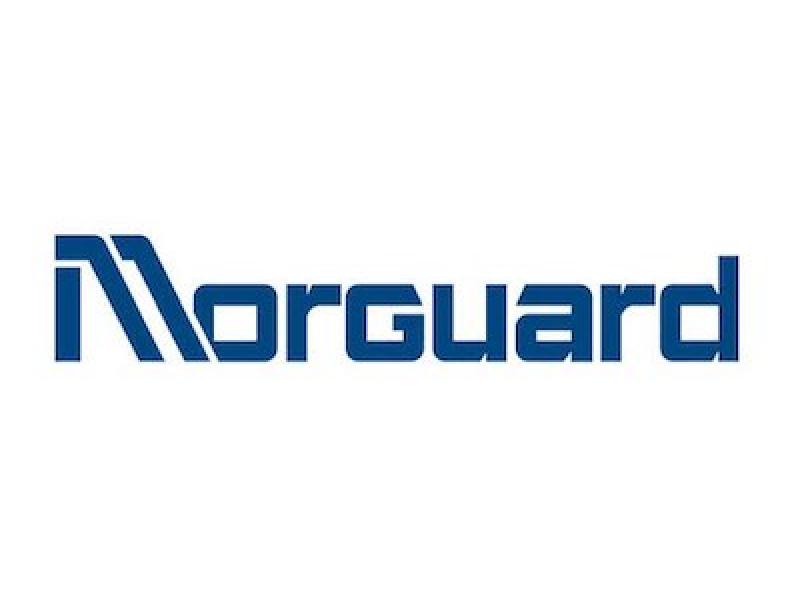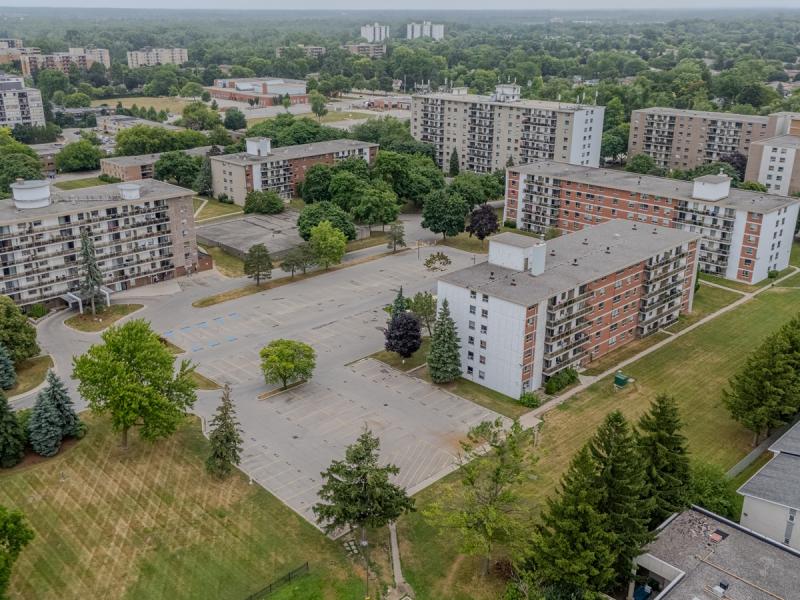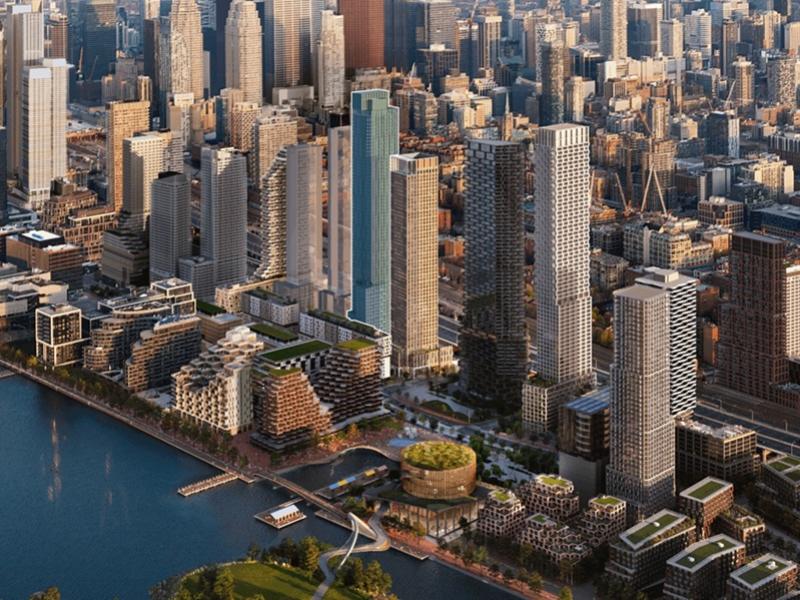
Hazelview Investments is playing a part in trying to alleviate Toronto’s rental housing deficit with a couple of major projects that will deliver over 1,300 rental units to a market desperate for inventory. It will also result in the upgrading of 184 existing apartments.
The developer and manager, which operates more than 23,000 rental units in 25 cities spanning six provinces, has around 1,000 units planned in the Bloor and Dufferin neighbourhood, and 520 new and refurbished suites at 73 and 75 Broadway Ave. in Midtown.
The latter project is employing a dual strategy at one location: the refurbishment of the 184 existing apartments in a 10-storey, 1960s-era building and the construction of an adjoining 38-storey tower which will contain 336 units. Completion is slated for either the first or second quarter of 2025.
Sustainability is a recurrent theme throughout Hazelview’s portfolio and that’s why, in addition to building an eco-friendly high-rise, it has taken the opportunity to revitalize the existing six-decade-old apartment tower.
“We know that housing stock needs an injection of capital to make sure that it’s viable for the long run, because a lot of it is getting on in years,” Colleen Krempulec, Hazelview’s managing partner and head of sustainability and brand, told RENX.
“For us to be able to build brand new units and invest in the uptake and modernization of some of the aged rental stock in the city, all on one site, is important,” she continued. “We keep our eye on quality rental housing that’s been around for decades, but make sure it remains for decades as good quality, and viable, rental housing.”
In adherence to Section 111 of the City of Toronto Act, tenants in the existing 184 units weren’t displaced. While some chose to vacate rather than endure intrusive construction — with the right of return, as per the Act — others remained.
Upon completion, the existing building will have an upgraded common area and every unit will be fitted with electrical pumps to reduce natural gas consumption, which Hazelview estimates will reduce greenhouse gas emissions by 95 per cent.
Both buildings will have high-performance building envelopes to control climate, sustainable electrical distribution, EV charging stations and other features to minimize their carbon footprints.
Outdated apartment inventory
Noting that much of Canada’s purpose-built rental housing is “vintage stock,” Krempulec said Hazelview is investing throughout its entire rental portfolio to satisfy contemporary sustainability standards.
And not, necessarily, only because sustainability has become a cornerstone of the company’s branding.
“Part of what we focus on is energy efficiency, water heat, water consumption reduction — and not just because we know it’s good for the environment, but because we know that tenants prioritize that too. They’re asking for green buildings,” she said.
Purpose-built rental buildings sprouted all over Toronto between the 1960s and 1980s, but their development tapered in the early 1990s when Canada fell into a deep recession and Toronto introduced rent controls.
However, Krempulec said aging inventory isn’t just a Toronto problem, it’s a Canada-wide issue and the sheer volume can be overwhelming.
“So much of the multifamily stock in Canada is what I’d call ‘vintage stock,’” Krempulec said. “Some of the challenges that exist are bringing that product up to modern-day, sustainable standards, and that’s something we’re actively investing in across our entire portfolio.
“That’s something we have to keep focusing on.”
Strong market fundamentals
Although demand for rental housing in Canada has never been greater, not every outdated apartment building is a suitable candidate for renewal or redevelopment.
At 73 and 75 Broadway Ave., which is located in one of the country’s most densely populated neighbourhoods, the pieces fell into place for both aspects of the project.
Metres from Yonge Street, the commercial fundamentals around the building site are scarcely rivalled anywhere else in the metropolitan region. With a subway station nearby at the corner of Yonge and Eglinton, as well as a dedicated crosstown LRT on the latter thoroughfare, the neighbourhood has attracted corporate and entertainment-oriented businesses in the last 15 years.
“We’re looking at a vast array of tenants, but we know that in the Yonge-Eglinton node there’s a high concentration of young professionals and starter families, and they’re our target audience,” Krempulec said.
In addition to the 520 rental units at 73 and 75 Broadway Avenue, Hazelview is developing three mid-rise towers in the Bloor and Dufferin neighbourhood, which will add roughly 1,000 more rental suites to the city’s inventory.
Just a short trek from Dufferin Subway Station on the TTC line, 1141 Bloor St. W. is a master-planned mixed-use community that neatly conforms to the province’s intensification mandate. In addition to the 1,000 rental suites and 56 dedicated affordable housing units (in partnership with Fitzrovia), the master-planned hub will bring new office and retail space to the largely residential community.
Plans for the master-planned community include transforming the intersection’s drab surroundings with a park, while the inclusion of a public daycare will, much like 73 and 75 Broadway Avenue, also attract young families.
The community is also designed to augment traffic circulation in what is presently a very congested node through the addition of new roads and much less cumbersome TTC accessibility.
“As part of the development through the City of Toronto’s community benefits package, there will be an underground tunnel for pedestrians to access the subway station,” Krempulec said. “Location and connectivity to public transit is important for us during our site selection.”
The two projects are just a small snapshot of Hazelview's complete list of projects in the GTA and in other cities, Krempulec said.
“We have about 20,000 units of multifamily housing in our pipeline.”










